
Algeria, officially the People's Democratic Republic of Algeria, is a country in North Africa. Algeria is bordered to the northeast by Tunisia; to the east by Libya; to the southeast by Niger; to the southwest by Mali, Mauritania, and Western Sahara; to the west by Morocco; and to the north by the Mediterranean Sea. It is considered part of the Maghreb region of North Africa. It has a semi-arid geography, with most of the population living in the fertile north and the Sahara dominating the geography of the south. Algeria covers an area of 2,381,741 square kilometres (919,595 sq mi), making it the world's tenth largest nation by area, and the largest nation in Africa, being more than 200 times as large as the smallest country in the continent, The Gambia. With a population of 44 million, Algeria is the ninth-most populous country in Africa, and the 32nd-most populous country in the world. The capital and largest city is Algiers, located in the far north on the Mediterranean coast.

Albert Camus was a French philosopher, author, dramatist, and journalist. He was the recipient of the 1957 Nobel Prize in Literature at the age of 44, the second-youngest recipient in history. His works include The Stranger, The Plague, The Myth of Sisyphus, The Fall, and The Rebel.

Algiers is the capital and largest city of Algeria. The city's population at the 2008 census was 2,988,145 and in 2020 was estimated to be around 4,500,000. Algiers is located on the Mediterranean Sea and in the north-central portion of Algeria.
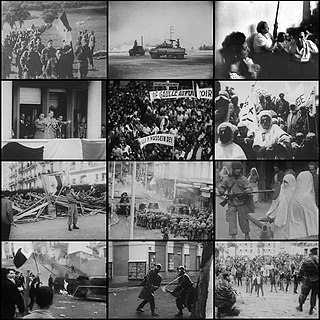
The Algerian War was a major armed conflict between France and the Algerian National Liberation Front from 1954 to 1962, which led to Algeria winning its independence from France. An important decolonization war, it was a complex conflict characterized by guerrilla warfare and war crimes. The conflict also became a civil war between the different communities and within the communities. The war took place mainly on the territory of Algeria, with repercussions in metropolitan France.

Oran is a major coastal city located in the north-west of Algeria. It is considered the second most important city of Algeria after the capital Algiers, due to its population and commercial, industrial, and cultural importance. It is 432 km (268 mi) west-south-west from Algiers. The total population of the city was 803,329 in 2008, while the metropolitan area has a population of approximately 1,500,000 making it the second-largest city in Algeria.

French Algeria, also known as Colonial Algeria, was the period of French colonisation of Algeria. French rule in the region began in 1830 with the invasion of Algiers and lasted until the end of the Algerian War of Independence in 1962. While the administration of Algeria changed significantly over the 132 years of French rule, the Mediterranean coastal region of Algeria, housing the vast majority of its population, was an integral part of France from 1848 until its independence.

The Maghreb, also known as the Arab Maghreb and Northwest Africa, is the western part of North Africa and the Arab world. The region includes Algeria, Libya, Mauritania, Morocco, and Tunisia. The Maghreb also includes the disputed territory of Western Sahara and the Spanish cities Ceuta and Melilla. As of 2018, the region had a population of over 100 million people.
The Pieds-Noirs, are the people of French and other European descent who were born in Algeria during the period of French rule from 1830 to 1962; the vast majority of whom departed for mainland France as soon as Algeria gained independence or in the months following.
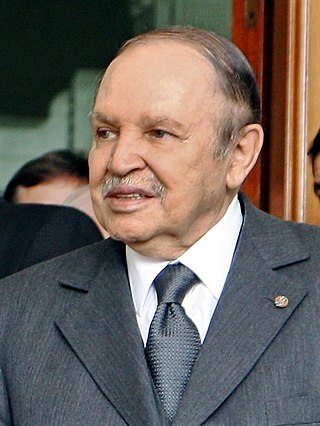
Abdelaziz Bouteflika was an Algerian politician and diplomat who served as President of Algeria from 1999 to his resignation in 2019.

The National Liberation Front is a nationalist political party in Algeria. It was the principal nationalist movement during the Algerian War and the sole legal and ruling political party of the Algerian state until other parties were legalised in 1989. The FLN was established in 1954 from a split in the Movement for the Triumph of Democratic Liberties from members of the Special Organisation paramilitary; its armed wing, the National Liberation Army, participated in the Algerian War from 1954 to 1962. After the Évian Accords of 1962, the party purged internal dissent and ruled Algeria as a one-party state. After the 1988 October Riots and the Algerian Civil War (1991–2002) against Islamist groups, the FLN was reelected to power in the 2002 Algerian legislative election, and has generally remained in power ever since, although sometimes needing to form coalitions with other parties.

Algeria, since December 18, 2019, is divided into 58 wilayas (provinces). Prior to December 18, 2019, there were 48 provinces. The 58 provinces are divided into 1,541 baladiyahs (municipalities). The name of a province is always that of its capital city.
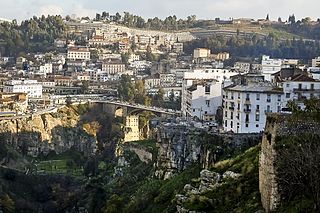
Constantine, also spelled Qacentina or Kasantina, is the capital of Constantine Province in northeastern Algeria. During Roman times it was called Cirta and was renamed "Constantina" in honor of emperor Constantine the Great. It was the capital of the French department of Constantine until 1962. Located somewhat inland, Constantine is about 80 kilometres from the Mediterranean coast, on the banks of the Rhumel River.

The Algeria national football team represents Algeria in men's international football and is governed by the Algerian Football Federation. The team plays their home matches at the 5 July Stadium in Algiers and Miloud Hadefi Stadium in Oran. Algeria joined FIFA on 1 January 1964, a year and a half after gaining independence. They are the current champions of the FIFA Arab Cup.

The Algerian Football Federation (AFF); is the governing body of football in Algeria. It was formed in 1962 and was based in the capital Algiers. It has jurisdiction on the Algerian football league system and is in charge of the men's and women's national teams. Although an unofficial national team had played fixtures since 1958, the first recognized international took place in January 1963, some six months after independence. In 2021, twenty structures were added to the Algerian Football Federation. Algeria has to work with new players but has already qualified for AFCON 2021. AFCON stands for Africa Cup of Nations. Algeria has 17 players in French Ligue 1. The Algerian Football Federation is considered a member of FIFA.

The Sand War or the Sands War was a border conflict between Algeria and Morocco in October 1963. It resulted largely from the Moroccan government's claim to portions of Algeria's Tindouf and Béchar provinces. The Sand War led to heightened tensions between the two countries for several decades. It was also notable for ushering in the first multinational peacekeeping mission carried out by the Organisation of African Unity.

Jeunesse Sportive de Kabylie, , known as JS Kabylie or JSK, is an Algerian professional football club based in Tizi Ouzou. The club is named after the cultural, natural and historical region that is home to the Kabyle Berber people speaking Kabyle. The club was founded in 1946 and its colours are yellow and green. Their home stadium, 1 November 1954 Stadium, has a capacity of 25,000 spectators. The club is currently playing in the Algerian Ligue Professionnelle 1. It is the most successful football club in Algeria.

The insurgency in the Maghreb refers to the Islamist insurgency in the Maghreb region of North Africa that followed on from the end of the Algerian Civil War in 2002 to the present day. The Algerian militant group Salafist Group for Preaching and Combat (GSPC) allied itself with al-Qaeda to eventually become al-Qaeda in the Islamic Maghreb (AQIM). The Algerian and other Maghreb governments fighting the militants have worked with the United States and the United Kingdom since 2007, when Operation Enduring Freedom – Trans Sahara began. While the 2011 Arab Spring affected support for the insurgency, it also presented military opportunities for the jihadists. In 2012, AQIM and Islamist allies captured the northern half of Mali, until being fought back less than a year later following a French-led foreign intervention, which was succeeded by the Sahel-wide Operation Barkhane. In Libya, the ISIL/ISIS/IS/Daesh was able to control some limited territory during the Second Libyan Civil War, amid allegations of local collaboration between the rival AQIM and ISIL.
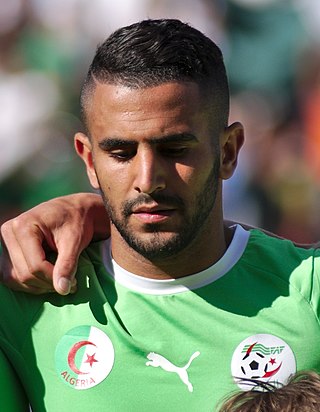
Riyad Karim Mahrez is a professional footballer who plays as a winger for Premier League club Manchester City and captains the Algeria national team.
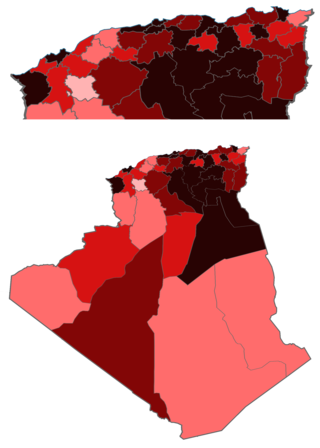
The COVID-19 pandemic in Algeria is part of the worldwide pandemic of coronavirus disease 2019 caused by severe acute respiratory syndrome coronavirus 2. The virus was confirmed to have spread to Algeria in February 2020. In December it was announced that Algeria intended to launch COVID-19 vaccinations in January 2021.
On 29 January 2021, Algeria launched a COVID-19 vaccination campaign, a day after receiving its first shipment of 50,000 doses of the Russia's Sputnik V vaccine. As of 6 June 2021, around 2.5 million doses have been administered. Algeria is currently vaccinating its population with both Sputnik V and Oxford-AstraZeneca vaccines.



















